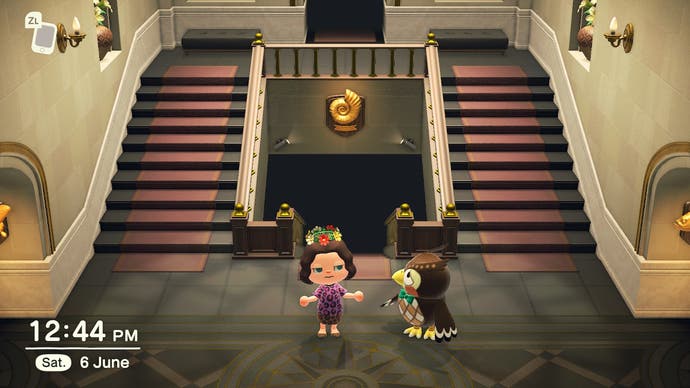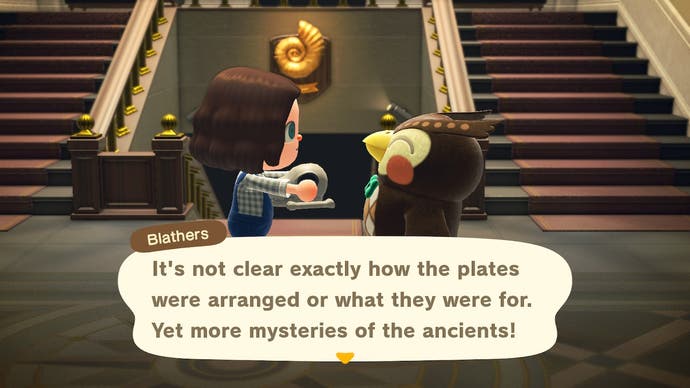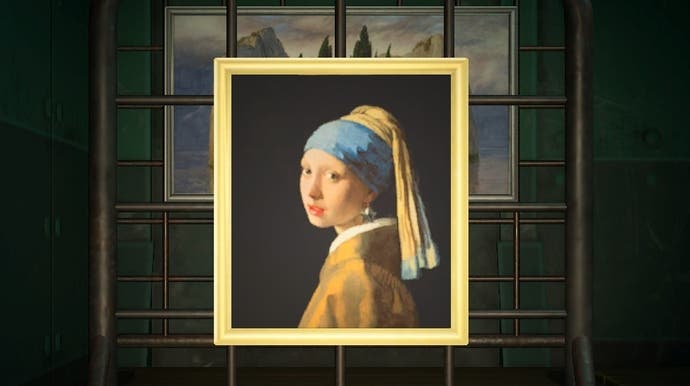An investigation into Blathers
Serious questions of museum standards, ethics, and legalities arise for Animal Crossing's resident Curator…
The Museum is a staple of Animal Crossing. It collects bugs, fish, and fossils, all sourced locally from players for display, and more recently, artistic works have been added. It acts as a living catalogue of your island experiences. But, as a real-world museum professional of over a decade's experience in museums big and small, I have some serious questions about the conduct of the museum's sole employee. Who exactly is Blathers, the enigmatic overlord of the island's cultural hub?
There are two options here. Firstly, Blathers may be blameless for his museum's shortcomings. He may be the overworked, underpaid, singular member of staff at a small, local museum. Many small museums with a local focus can only afford a skeleton crew; some really great and important places like Dr Johnson's House and the Cartoon Museum only have a few staff. You would expect Blathers to have an army of volunteers supporting him, but since the other island residents show precious little interest in even helping with donations (wasters), we shouldn't be surprised at their lack of civic duty. But this museum is huge; the Animal Crossing museum of old was on a scale where you could believe it was a small local indie. This one is a significant step up - a high tech natural history/ aquarium/ botanical garden hybrid with an internationally significant art collection. There could have been a recent influx of grant money, but Blathers never leaves the door - when did he have time to contend with that kind of labour-intensive administration?
Another question arises here: who does Blathers answer to? Small museums are usually run by the local council, or are independent and have a Board of Trustees who guide the museum's direction, and make sure it remains true to its purpose and the industry standards all museums must abide by. In some ways, it would be classic Tom Nook to have built his own museum to show off the treasures of his Island. (No one from Nook, Inc. was available for comment at the time of writing.) But as the museum has no way of making money, attracting tourists, or edifying the great Nook name, we have to assume he's not pulling the strings here.

So, this huge, high-tech new museum building seemingly has no Trustees or guiding body in place, or checks to ensure it remains true to professional standards or a community-focused vision. Which brings us to option two:
Blathers is an independently wealthy private collector who's gone totally rogue.
There is a long and problematic history of rich men collecting around their own personal interests and forming a private museum. Henry Wellcome, a late-nineteenth century pharmaceutical tycoon, is a prime example of someone who spent his millions collecting anything and everything around the world to do with the history of medicine until his death in 1934 - the Science Museum holds over 100,000 objects from his original collection, but it's estimated that that is less than 10 percent of the total he amassed in his lifetime (and he was not nearly as concerned as Blathers about duplication). Many museums and galleries, like the Ashmolean Museum, the Horniman, the Getty, the Guggenheim, and the Tate are all named after wealthy benefactors and their legacy collections. And while the museum in Animal Crossing has no name, there is a picture of a very familiar-looking owl above the door...
This certainly explains Blathers' total lack of due diligence. Sure, he won't accept duplicates or obviously fake art, but he will accept almost anything else into the natural history and aquatics collection. In the case of the insects and fish, there is a real ethical question about their captivity. This is especially the case for frogs and octopi, who also exist as islanders. What do they think of their brethren living in glass cases when they have a nice house by the river? Does Blathers see islanders as potential exhibits, reminiscent of some of the darker histories of wealthy collectors using human beings for display?

Damning though the moral side of Blathers' live exhibits is, it is in fossils and art that he really gets into a legal mess. If a shady character living on a boat turned up at a modern gallery selling an original Leonardo Da Vinci for under five grand, any self-respecting curator would rugby tackle them to the ground and call Interpol. But Blathers willingly accepts priceless works of art without ever asking how you came by such a treasure, or for any kind of paperwork - a deliberate attempt to create plausible deniability, no doubt. The fossils of rare extraction are similarly suspicious; it is highly unlikely that these fossils are native to your island. Species as diverse as the African Spinosaurus and the largely American Dimetrodon having shared a history on a landmass the size of a shopping mall is impossible. How these fossils are showing up near the surface with alarming regularity points strongly towards archaeological fraud.
Modern museums have detailed collecting policies that govern these legalities and more - these policies dictate what they commit to hold forever. It takes an army of specialist professionals to care for this material to appropriate museum standards, and normally over 95 percent of a collection will be in storage at any one time. Blathers just takes any old thing and whacks it on display with no regard for security, appropriate light levels, or the long-term survival of delicate artifacts. He has no conservators to closely examine and care for his objects, and no registrars to ensure legal and ethical compliance. It is starting to look like this is deliberate.
It is impossible to ignore that Blathers as a private collector is acting outside of the law and professional standards, with scant regard for ethical museum practice. He has developed the nineteenth century morals of the worst Dickensian villain. But what happens next for his collection, with neither law enforcement nor ethical governing body to reign him in?
Well, one day Blathers is going to die. And when he does, if he remains true to form like the private collectors of yore, he will leave it to another museum. His name will be above the door, and it will be down to myself and my colleagues to try (and likely fail) and right the wrongs of his unspeakably immoral and unquestionably illegal collecting practices.
Donate to the museum if you must, but know that you are complicit in Blathers' crimes.















